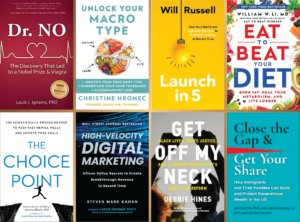Top Writing Tips for Non-Writers

Share
People come to us all the time with the same excuse:” I’m not a writer, I can’t write a book!” so, we’ve put together our “Top Writing Tips for Non-Writers” to help you keep writing when your mind is saying you can’t.
Maya Hoffman (Ghostwriter and Book Coach)
Carve out time in your daily schedule where you only focus on writing, or thinking about your writing. It could be just 1 hour a day, but it helps you get into the habit of having the wheels turning in your mind. Also, write the part you feel energy for – if you don’t have energy around a bit, circle back to it later. Or trick yourself into writing it with a reward.
Aubrey Polliard (Ghostwriter and Project Manager)
Read. If you’re struggling with what to write or how to write it, learn from the masters themselves. Find books that you are interested in, in the same genre(s) that you are attempting to write, and read as much as you can – but do it with an eye for the style. Pay attention to how the author organizes their content, structures their paragraphs, uses imagery, etc. Then, when you’re ready to try it on your own, you’ve got someone to emulate.
Dylan Hoffman (Ghostwriter and Book Coach)
If you’re feeling stuck each time you sit down to write, try this exercise. Set a timer for about five minutes, and then set the color of your font in your word processor to white, so that you can’t see what you’re typing. Then, for the next five minutes, just write whatever comes to mind. Don’t let your fingers stop moving at all, just type. It can be anything, something to stall, like, “I don’t know what to write, I don’t know what to write why can’t I write?” Or something goofy like (and this is a real example of me doing the exercise), “The other day, three clorgbogs came in, and doffed their caps, as a clorgbog is known to do, to the Queen, who, having just taken a sizeable bite of muffin, could only gargle.”
Or it can be pertinent to whatever you’re writing about, but only if that’s what comes to mind. The white text stops you from going back and judging what you have written. And that’s all that writer’s block usually is: excessive judgment. When you do this exercise, it trains you to welcome ideas as they come. Eventually, you will get to a point where you can sit down, and just start to write your book.
Leslie Marshall (Ghostwriter)
When you sit down to write, never let the perfect be the enemy of the good. People often feel they must have flawless, flowing prose by the end of a writing session—but this almost never happens, even for the most famous of literary giants. As E. B. White once said, “Writing is an act of faith, not a trick of grammar.” The point is to believe that you have something you want to say, and to try to say it.
With this in mind, don’t feel that everything you write must be connected. Free yourself up to write in sections that are clear and engaging in themselves, but not necessarily dependent upon each other. Books are born in the process of revision, and there will be plenty of time to come back later and rearrange the sections and find the connective tissue of language that will make them flow in a pleasing and instructive way.
Robin Colucci (CEO)
When you’re staring at a blank page, write something. And don’t do any editing until you have at least four or five paragraphs down. The reason I say this is because, usually, the true opener to the chapter will show up about three to five paragraphs in. If you try to write the perfect opening line before you move on to the rest, you could spend hours typing and deleting, and typing and deleting, and never find it.
Pick your topic, let the juices flow and write what occurs to you. Then go back and refine and figure out the best flow. I find this leads to greater productivity and less frustration every time.
The Bottom Line is This:
Every book gets written by writing. Use these tips from our team to get out of your own way and write.



